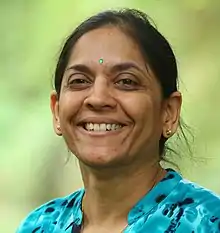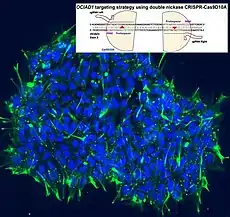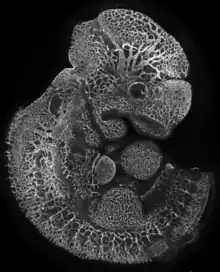Maneesha S. Inamdar
Maneesha S. Inamdar (born 25 February 1967) is an Indian developmental biologist specialising in stem cell research. She is a Professor and Chair at the Molecular Biology and Genetics Unit of the Jawaharlal Nehru Centre for Advanced Scientific Research (JNCASR). She was as an adjunct faculty at the Institute for Stem Cell Biology and Regenerative Medicine (inStem) and is an elected fellow of the Indian Academy of Sciences and the Indian National Science Academy.[1][2]
Maneesha S. Inamdar | |
|---|---|
 | |
| Born | 25 February 1967 India |
| Nationality | Indian |
| Alma mater | |
| Known for | comparative analysis of cardiovascular development and stem cells |
| Awards |
|
| Scientific career | |
| Fields | |
| Institutions | |
Biography

Maneesha Inamdar, born on 25 February 1967, received a doctorate in molecular biology at Tata Institute of Fundamental Research (TIFR) and completed post-doctoral work in cardiovascular biology at the University of North Carolina at Chapel Hill. Subsequently, she joined Jawaharlal Nehru Centre for Advanced Scientific Research (JNCASR), where she holds the position of a professor of the Molecular Biology and Genetics Unit of the institution
At JNCASR, she has established her laboratory for stem cell research and hosts several research scholars, postdoctoral fellows, trainees and collaborators.[3] She also served as an adjunct faculty at the Institute for Stem Cell Biology and Regenerative Medicine (inStem).[4] She also served as an adjunct faculty at the Institute for Stem Cell Biology and Regenerative Medicine (inStem).[4]
Research


Inamdar's group works on the basic biology of stem cells .
The group led by her has developed normal stem cell lines from defective embryos and these have been deposited at the UK Stem Cell Bank.[5] Their efforts have been included in the International Stem Cell Forum (ISCI2) initiatives and they represent the sole contribution of India in these initiatives. Inamdar is also working on the development of regenerative therapeutic methods by collecting patient-derived induced pluripotent stem cells (iPS) for which they have generated mouse and human induced iPS cells. Her studies have been documented by way of a number of articles and resource materials.[6]
Professional activities
Inamdar has carried out projects for the Department of Biotechnology, the Department of Science and Technology, the Council of Scientific and Industrial Research and other international agencies including the UK-India Education and Research Initiative (UKIERI), Indo-US Science and Technology Forum (IUSSTF), The Wellcome Trust, UK, the DBT-Indo-Danish programme and the Indo-French Centre for the Promotion of Advanced Research (IFCPAR/CEFIPRA).[7]
She is a member or life member of the Indian Society of Cell Biology,[8] the Society for Developmental Biology, USA, the International Society for Stem Cell Research (ISSCR), the North American Vascular Biology Organization (NAVBO) and the Indian Society of Developmental Biologists.[9]
She represents India in the International Stem Cell Initiative (ISCI) and the International Stem Cell Banking Initiative (ISCBI) where she is also a member of the steering group. She also serves as an expert and advisor in various capacities in several national and international committees including hESC Registry Europe, International Stem Cell Registry, Europe. She is Chairperson or a member of several national and institutional advisory and review committees for ethics and stem cell research. Inamdar is a member of the Global Forum on Bioethics in Research (GFBR) planning committee and the World Health Organization (WHO) expert advisory committee to examine the scientific, ethical, social and legal challenges associated with Human Genome editing.
Honors
Inamdar was selected as a Young Associate of the Indian Academy of Sciences in 1999, with the tenure running until 2002.[10] The Department of Biotechnology (DBT) of the Government of India awarded her the National Bioscience Award for Career Development, .[1] She was awarded the National Women Bioscientist Award, in 2011. The Indian Academy of Sciences honoured her with elected fellowship in 2017.[11] She was also elected Fellow of the Indian National Science Academy in 2018. She was awarded the Dr Kalpana Chawla Award for 2017[12][13] and the Prof. C.N.R. Rao Oration Award[14] and the J C Bose National Fellowship in 2019.
Selected bibliography
- Sinha, Saloni; Dwivedi, Tirath R; Yengkhom, Roja; Bheemsetty, Venkata A; Abe, Takaya; Kiyonari, Hiroshi; VijayRaghavan K and Inamdar, Maneesha S. "Asrij/OCIAD1 suppresses CSN5-mediated p53 degradation and maintains mouse hematopoietic stem cell quiescence." Blood. doi:10.1182/blood.2019000530.
- Sinha, Saloni; Ray, Arindam; Abhilash, Lakshman; Kumar, Manish; Sreenivasamurthy, Sreelakshmi K; Keshava Prasad TS; Inamdar Maneesha S. "Proteomics of Asrij perturbation in Drosophila lymph glands for identification of new regulators of hematopoiesis." Molecular and Cellular Proteomics. doi:10.1074/mcp.RA119.001299.
- Joshi, Divyesh and Inamdar, Maneesha S. "Rudhira/BCAS3 couples microtubules and intermediate 1 filaments to promote cell migration for angiogenic remodeling." Molecular Biology of the Cell. doi:10.1091/mbc.E18-08-0484.
- Shetty, Deeti K.; Kalamkar, Kaustubh P.; Inamdar, Maneesha S. (2018-07). "OCIAD1 Controls Electron Transport Chain Complex I Activity to Regulate Energy Metabolism in Human Pluripotent Stem Cells". Stem Cell Reports. 11 (1): 128–141. doi:10.1016/j.stemcr.2018.05.015. ISSN 2213-6711.
- Sinha, Saloni; Bheemsetty, Venkata Anudeep and Inamdar, Maneesha S. "A double helical motif in OCIAD2 is essential for its localisation, interactions and STAT3 activation. Scientific Reports. doi:10.1038/s41598-018-25667-3.
- Shetty, Ronak; Joshi, Divyesh; Jain, Mamta; Vasudevan, Madavan; Paul, Jasper Chrysolite; Bhat, Ganesh; Banerjee, Poulomi; Abe, Takaya; Kiyonari, Hiroshi; VijayRaghavan K and Inamdar Maneesha S (2018-04-04). "Rudhira/BCAS3 is essential for mouse development and cardiovascular patterning".Scientific Reports. 8 (1). doi:10.1038/s41598-018-24014-w. ISSN 2045-2322.
- Ranganath, Sudhir H.; Tong, Zhixiang; Levy, Oren; Martyn, Keir; Karp, Jeffrey M.; Inamdar, Maneesha S. (2016-06). "Controlled Inhibition of the Mesenchymal Stromal Cell Pro-inflammatory Secretome via Microparticle Engineering". Stem Cell Reports. 6 (6): 926–939. doi:10.1016/j.stemcr.2016.05.003. ISSN 2213-6711.
- Shetty, Deeti K.; Inamdar, Maneesha S. (2016-03). "Generation of a heterozygous knockout human embryonic stem cell line for the OCIAD1 locus using CRISPR/CAS9 mediated targeting: BJNhem20-OCIAD1-CRISPR-39". Stem Cell Research. 16 (2): 308–310. doi:10.1016/j.scr.2015.12.037. ISSN 1873-5061.
- Khadilkar, Rohan J.; Rodrigues, Diana; Mote, Ridim Dadasaheb; Sinha, Arghyashree Roychowdhury; Kulkarni, Vani; Magadi, Srivathsa Subramanya; Inamdar, Maneesha S. (2014-03-18). "ARF1–GTP regulates Asrij to provide endocytic control of Drosophila blood cell homeostasis". Proceedings of the National Academy of Sciences. 111 (13): 4898–4903. doi:10.1073/pnas.1303559111. ISSN 0027-8424.
- Inamdar, Maneesha S.; Healy, Lyn; Sinha, Abhishek; Stacey, Glyn (2011-10-29). "Global Solutions to the Challenges of Setting up and Managing a Stem Cell Laboratory". Stem Cell Reviews and Reports. 8 (3): 830–843. doi:10.1007/s12015-011-9326-7. ISSN 1550-8943.
- "Screening ethnically diverse human embryonic stem cells identifies a chromosome 20 minimal amplicon conferring growth advantage". Nature Biotechnology. 29 (12): 1132–1144. 2011-11-27. doi:10.1038/nbt.2051. ISSN 1087-0156.
- Inamdar, Maneesha S.; Venu, Parvathy; Srinivas, M.S.; Rao, Kamini; VijayRaghavan, K. (2009-04). "Derivation and Characterization of Two Sibling Human Embryonic Stem Cell Lines From Discarded Grade III Embryos". Stem Cells and Development. 18 (3): 423–434. doi:10.1089/scd.2008.0131. ISSN 1547-3287.
See also
Notes
References
- ""Awardees of National Bioscience Awards for Career Development" (PDF). Department of Biotechnology. 2016. Retrieved 2017-11-20" (PDF). 2016. Retrieved 1 August 2018.
- "Innovation in science need of the hour: CM". Deccan Herald. 7 August 2018. Retrieved 15 September 2020.
- "Maneesha Inamdar - Research Group". www.jncasr.ac.in. Retrieved 1 August 2018.
- "Faculty | InStem". instem.res.in. Retrieved 1 August 2018.
- "Maneesha Inamdar - Academic profile". www.jncasr.ac.in. Retrieved 1 August 2018.
- "Maneesha Inamdar - Publications". www.jncasr.ac.in. Retrieved 1 August 2018.
- ""Ensemble - Newsletter of the Indo-French Centre for the Promotion of Advanced Research" (PDF) (Press release). New Delhi: Indo-French Centre for the Promotion of Advanced Research. 2017. Mobility of Scientists / Researchers supported under CEFIPRA projects during January–March, 2017" (PDF). www.jncasr.ac.in. Retrieved 1 August 2018.
- "ISCB Home Page". www.iscb.org.in. Retrieved 1 August 2018.
- "InSDB :: Indian Society for Developmetal Biologist". www.devbioindia.org. Retrieved 1 August 2018.
- "Associateship | Indian Academy of Sciences". www.ias.ac.in. Retrieved 1 August 2018.
- "Fellowship | Indian Academy of Sciences". www.ias.ac.in. Retrieved 1 August 2018.
- "Innovation in science need of the hour: CM". Deccan Herald. 7 August 2018. Retrieved 8 August 2018.
- "KSCST : State Science and Technology Awards - 2017". www.kscst.iisc.ernet.in. Retrieved 8 August 2018.
- "Jawaharlal Nehru Centre for Advanced Scientific Research". www.jncasr.ac.in.
External links
- "Panel of Reviewers" (PDF). Indian Journal of Medical Research. 2015. Retrieved 29 January 2018.
- "Stem cells for the treatment of diseases". abc.org. 6 September 2011. Retrieved 29 January 2018.